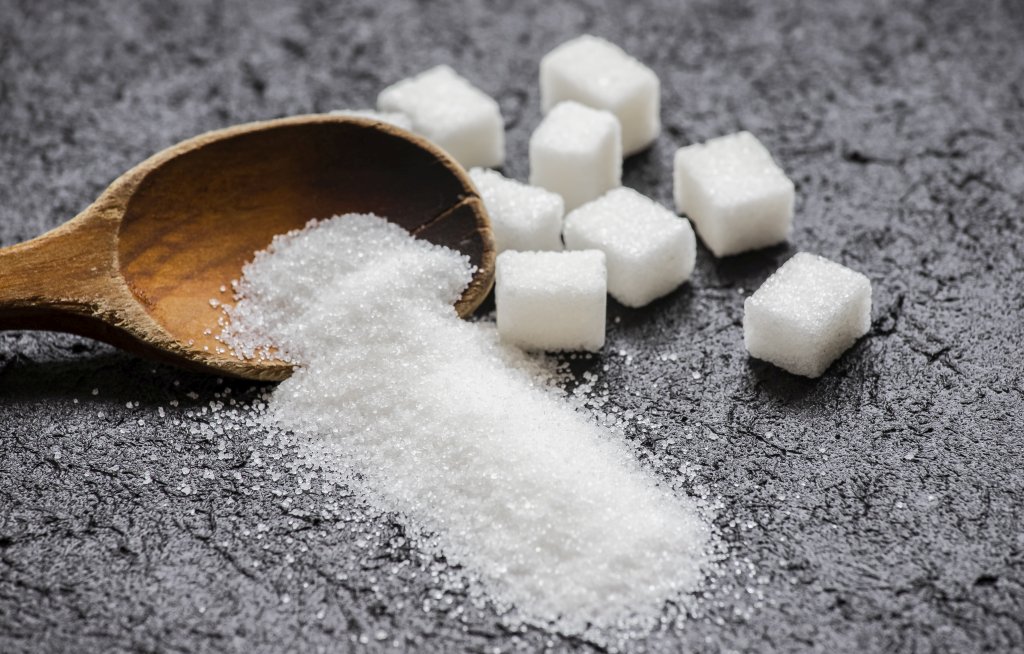Polyols – what they are and why you should include them in your keto diet

Polyols are sweeteners that do not contain sugar and are popular with people on a diet and diabetics. In our article, we take a closer look at what polyols are, what properties they have, why they are such a popular choice and whether they have any disadvantages.
What are polyols?
Polyols are chemicals from the group of hydroxy alcohols, also known as sugar alcohols, which have more hydroxyl groups (OH) in their structure. They are synthetic substances, often with a taste reminiscent of sugar, and a great many of them have been tested and are on the list of permitted substances used in the food industry authorised in the countries of the European Union. The most common ones, which are commonly used in commercially available products or as a separate product, are xylitol, sorbitol, malitol and erythritol.
Are polyols a sugar?
Polyols are polyols and, although they resemble sugars in taste and appearance, they have nothing in common with them. They are low in calories, from 0.2 to 2.6 kcal, and, in addition, their glycaemic index does not increase after consumption. They are therefore an ideal substitute for people with diabetes, as well as anyone on a reduction diet, where low calories are very important.
Are polyols an alcohol?
As the name suggests, polyols are derivatives of alcohols, but they have a different structure and a different way of being metabolised by humans than traditional compounds. This makes them non-threatening and unable to lead to intoxication.
Polyols – types of polyols
Polyols are quite an extensive group, and research is still ongoing on many of them in relation to their suitability for consumption. Of those already approved and harmless to humans, we can distinguish specific groups and their derivatives, which are often described with specific designations in the ingredients of food products: E420 – Sorbitol, E421 – Mannitol, E954 – Isomalt, E965 – Maltitol, E966 – Lactitol, E967 – Xylitol, E968 – Erythritol (Erythrol)
Xylitol – sweetener obtained from birch bark.
It is commonly referred to as birch sugar and is designated E967 in food products. In nature, it occurs naturally, apart from birch bark, in fruits such as raspberries and plums, but is extracted on a mass scale from maize. It exhibits the most beneficial properties of all polyols. The degree of sweetness is comparable to traditional sugar, but xylitol provides about 40% fewer calories than regular sugar – 240 kcal/100 g. At high doses, above 35 grams, it can have a laxative effect. It is used in the manufacture of pastes and gums because of its antibacterial and antifungal properties.
Erythritol – better than xylitol?
Erythritol is the other common sugar substitute with the symbol E968. It is extracted chemically for food purposes, while it occurs naturally mainly in fermented foods and some fruits. It has a zero glycaemic index, so is recommended for diabetics and people struggling with insulin resistance. It has about 20-40% less sweetness than regular sugar, so you usually need to use a little more of it. When consumed in excessive amounts, it can contribute to intestinal discomfort.
Sorbitol – low glycaemic index
It is found naturally in fruit and vegetables, and is most abundant in prunes. In the food industry it is used as a stabiliser, humectant and also as a preservative and is found under the symbol E420. The sweetness of sorbitol is approximately 30-40% less than that of sucrose, and it has a glycaemic index of 9, making it suitable for diabetics. Its use in excess may contribute to the development of diabetic nephropathy and reduce kidney function.
Maltitol – naturally occurring in food
It is referred to as E965 in food products, but occurs naturally in plants such as figs, olives and maize. Its glycaemic index is slightly higher than that of other sugar substitutes, at 35. The calorific value of maltitol varies between 270 and 300 per 100 g of product. It is mainly used in the production of chewing gum, ice cream or glazes.
Mannitol – the medical side of sugar alcohols
The last of the sugar alcohols discussed is mannitol, bearing the symbol E421. It has an energy value of 150 kcal per 100 grams and a glycaemic index of 0. But this is not why it is so popular in medicine – its use is linked to the fact that it has diuretic or, simply put, diuretic properties. It is therefore readily used in the treatment of kidney failure, as well as in cleansing the body of toxins by increasing fluid exchange. Research is also underway into the use of this compound in increasing the effectiveness of chemotherapy.
Applications and properties of polyols
Polyols are not only used in the food industry, but also in the pharmaceutical or chemical industries. They are an invaluable ingredient in the manufacture of tablets and medicines, especially for drugs where the use of simple sugars as fillers is not possible. In addition, they are used as antibody stabilisers, vaccines and solutions. They are also used in the production of syrups, to increase the concentration of sugars and stop bacteria multiplying. In addition, mannitol is used, for example, in experimental cancer therapies or kidney problems.
Polyols are also an excellent choice for people struggling with diabetes, as well as those on low-calorie diets. In addition, some studies show that sorbitol increases the absorption of iron and vitamin B12.
They are also often used in the manufacture of toothpastes, refreshing sprays and chewing gum. To a large extent, this is due to the fact that, due to their different composition from simple sugars, they do not break down and ferment in the mouth. This consequently ensures that they do not cause tooth decay.
Although replacing sugar with polyols has many advantages, are there any contraindications? Well, yes. They should be avoided by people who suffer from irritable bowel syndrome, women who are expecting a baby or people with phenylketonuria. In specific cases, polyols can also cause bloating, abdominal pain or diarrhoea.
Can polyols be used in the diet of a diabetic?
We know the types of polyols that can successfully find sustainable use in a diabetic diet. However, it is worth pointing out that it all depends on the type of sugar and the severity of the disease. Due to their calorie content, absorption rate and effect on index fluctuations, some polyols will be particularly strongly recommended for diabetics and others less so. Here, a good example is erythritol, whose sweetness is about 80% that of ordinary sugar and whose glycaemic index is 0.
Similar, although not as good indices are shown by sorbitol with an index of 9, birch sugar (xylitol) with an index of 13, or mannitol with an index of 0. The latter, however, is more often used in the production of medicines and in medicine than in food products.
Polyols – a good substitute for sugar in diabetes?
It is worth emphasising that polyols will not only be a good sugar substitute for diabetics. Because individual polyols are poorly absorbed from the gastrointestinal tract and do not significantly affect blood sugar levels, some polyols can be used, after careful screening, even by people with advanced diabetes as sweeteners. Most polyols can be used as sugar substitutes or sweeteners, but because of their temperature resistance, they can also be used in baking or cooking. Food manufacturers are already using polyols in food products for obese people or those on strict diets, and increasingly as a sweetener in products advertised as ‘sugar free’ or ‘sugar free’.
For example, birch sugar, because of its sweetness (about 90% the sweetness of sugar) and the fact that it does not lose flavour at high temperatures, is successfully used in the production of cakes and jellies with reduced sugar content.
What to eat on keto?
If you’re looking for inspiration on products to include in your keto diet, take a look at our detailed post: “The keto diet – what to eat”. It offers comprehensive information about the acceptable products on the ketogenic diet, with descriptions and practical advice. This will allow you to easily compose varied and appetising meals that support your health goals. Don’t delay, discover the wealth of knowledge we have prepared to help you achieve your goals!
How much polyols per day?
There are no daily limits on the use of polyols, but this does not mean that we should overdo it, and the recommended dose is around 10-50 grams per day. Part of the polyols are already absorbed in the small intestine, but the main digestion and breakdown process takes place in the large intestine, where the remainder is fermented and partially absorbed. Polyols used in larger quantities can have a laxative effect and cause gas, bloating and diarrhoea. When including sugar alcohols in the diet, it is important to do so gradually and not to increase the dose too quickly.
It is very important that polyols are discouraged in people struggling with irritable bowel syndrome and those suffering from gastrointestinal problems. Their use can lead to a worsening of wellbeing.
Are polyols healthy – summary
Polyols as a sweetener have been taking the food market by storm for several years. Due to their lower glycaemic index than traditional sugar, it is definitely worth including polyols in your daily menu, not only when you are on a diet. In addition, they carry many positive uses in the human body, from preventing tooth decay to reducing blood pressure. However, as with any product, polyols should also be used in moderation, gradually introduced into the diet and excluded from the daily menu if any adverse effects occur.


